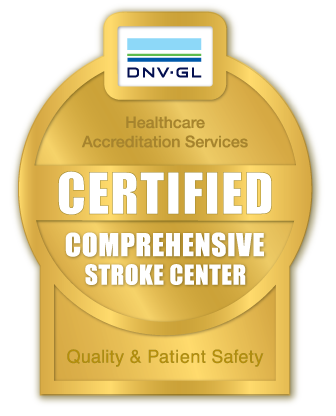Stroke Care in Dallas

Our team provides stroke care when every second counts. We’re ready to respond with potentially lifesaving treatments. That’s community and why so many people Trust Methodist.
If You Think You’re Having a Stroke, Call 911 Or Go to The Nearest Emergency Room
If you have symptoms of a stroke, get help right away. Seek immediate medical attention if you or someone you know has sudden:
- Confusion or difficulty understanding statements
- Drooping or paralysis on one side of the face
- Numbness or weakness in the face, arm, or leg
- Problems with walking or balancing
- Slurred speech
- Very painful headache, sometimes called a “thunderclap” headache
- Vision changes, including increased sensitivity to light
Remember B.E. F.A.S.T. for any stroke symptoms:
- Balance loss
- Eyesight changes
- Face drooping
- Arm weakness
- Speech difficulty
- Time to call 911!
Why Choose Methodist Dallas for Stroke Care
At Methodist Dallas Medical Center, you’ll benefit from our team of dedicated neurology specialists. We provide emergency stroke care, comprehensive rehabilitation, and support services. We also work with you to manage your risk factors and help prevent future strokes. Highlights of our program include:
- Advanced stroke care: We are a Certified Comprehensive Stroke Center (CSC), which means our team is able to treat even the most complex strokes. We evaluate, diagnose, and respond to strokes in a timely manner.
- Specially trained team: Our team includes experienced interventional neuroradiologists and endovascular neurosurgeons. These specialists use catheters (small, thin tubes) to deliver stroke treatments inside the blood vessels.
- Enhanced diagnostic capabilities: Doctors at Methodist Dallas use imaging studies, sophisticated software, and advanced technology to evaluate symptoms and make time-sensitive decisions. This technology enables us to deliver stroke treatments as quickly as possible.
Strokes We Treat
As leaders in neurology, our team treats even the most severe strokes. The two main types are:
- Ischemic: Most strokes are ischemic, which means they result from a blood clot. When a clot develops in an artery that supplies blood to the brain, it restricts or stops the flow of blood. Without blood, the brain doesn’t get the oxygen it needs.
- Hemorrhagic: Less than 15% of strokes are hemorrhagic (bleeding in the brain). They happen when a weakened blood vessel in the brain ruptures. Blood accumulates in the area and damages brain tissue.
Most ischemic strokes result from atherosclerosis (fatty deposits that build up inside blood vessels). These deposits (plaque) break off and combine with clotted blood, blocking the flow of blood through the vessel.
High blood pressure is the most common cause of hemorrhagic stroke. That’s because, over time, increased blood pressure weakens the vessel walls, making them more likely to burst.
Stroke Treatments We Offer
The first steps in treating a stroke are to determine the type and evaluate the part of the brain affected. Our team uses AI and other advanced technology to provide a timely diagnosis.
To treat an ischemic stroke (blood clot), we may:
- Use medications to help dissolve the clot
- Remove the clot using a catheter (long, thin tube), which we guide through a small incision
To treat a hemorrhagic stroke (brain bleed), we may:
- Use medications to help prevent further bleeding in the brain
- Recommend surgery to decrease the bleeding
The endovascular neurosurgeons and interventional neuroradiologists at Methodist Dallas have experience delivering these advanced treatments. Your care team will determine the most appropriate treatment plan based on many factors.

Certified Comprehensive Stroke Center (CSC)
Methodist Dallas earned designation as a Certified Comprehensive Stroke Center (CSC) by The Joint Commission and the American Heart Association (AHA). To achieve this distinction, hospitals must meet or exceed a set of high standards. These include responding to and diagnosing stroke quickly, using advanced technology to deliver effective treatments, and offering comprehensive rehabilitation services.
The CSC designation is the highest level of certification offered by The Joint Commission and the AHA. You can feel confident knowing that our team has the knowledge and expertise to treat even the most severe and complex strokes.
Stroke rehabilitation and support, tailored to you
Recovering from a stroke can be challenging. We’re here to guide you through the rehabilitation process. You’ll have a team of skilled physical therapists (PTs), occupational therapists (OTs), and speech-language pathologists (SLPs) devoted to your recovery. Whether you need help walking, performing daily activities, or speaking and swallowing, we offer customized care plans and support.
Through our partnership with Methodist Rehabilitation Hospital, we offer streamlined rehab services. We’re passionate about providing you with seamless care so you can focus on healing.
Customized preventive care
Up to 80% of strokes are preventable — with healthy lifestyle choices, you can lower your risk. Our team is committed to helping you understand your risk factors and helping to reduce your chance of having a stroke.
We work closely with you to evaluate factors that may put you at a higher risk. These include high blood pressure (hypertension), high cholesterol, and atrial fibrillation, (AFib or irregular heartbeat). We also consider your family history of stroke and heart disease, along with your diet, activity level, and overall health.
Take our free stroke risk assessment to learn more about your risk. Using this information, we’ll work with you to create a personalized plan to help you lower your chance of stroke. You’ll also receive compassionate support and guidance along the way.
We can help you find a doctor.